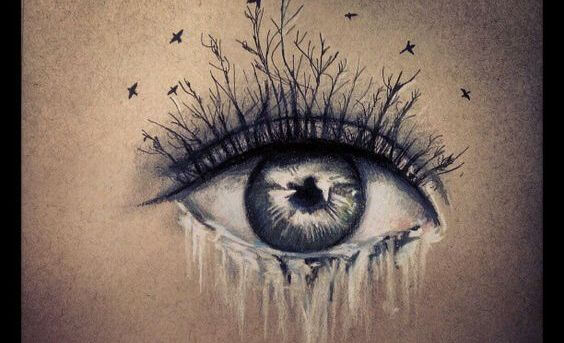A Kind of Pain that Has No Name

Some kinds of pain leave a mark on you and leave you speechless. For some losses, there really are no words. It hurts to be an orphan or a widow, but when your child dies, you realize that nothing you can say can reflect how you feel. This is a kind of pain that has no name.
A pain that hurts you on the inside, because you’ve lost a part of you, a part that you’ve built your life on. And therefore, your life has lost some of its meaning, because all you feel is guilt, because you should have gone first, you should have been good enough to keep them from passing.
Although the distress you feel is normal, making yourself feel guilty is nothing more than a product of self-contempt that you feel because you continue to live when it’s children who are supposed to survive their parents.
“Do not pity the dead, Harry. Pity the living, and above all, those who live without love.”
-J. K. Rowling-
It’s not your fault
The inner voice of your conscience is especially intense during these painful times. That little Jiminy Cricket that usually helps you distinguish right from wrong can torment you when you remember a past that could have been and wasn’t. It leads you to blame yourself for a past that was out of your control.

It fills you with thoughts of self-blame like the following: “What if I woke up earlier?,” “What if he was sick and I didn’t see it?,” “If I had acted differently…” But the truth is that in all likelihood, there was nothing you could have done to change what happened. Death happens. We don’t usually know when, and it’s irrational to try to make sense of it.
Sometimes, differentiating between guilt and responsibility is very difficult. If you become consumed pain that surrounds you, you’ll prevent yourself from overcoming it and moving forward. Guilt doesn’t respond to logic, it just invades you completely. Because you don’t understand what happened and you can’t accept it without feeling guilty over it.
And even though understanding the pain is the first step towards acceptance, you don’t always have to understand all the “whys” behind the loss, because most of the time there is no reason why; it just happens.
“You think the dead we loved ever truly leave us? You think that we don’t recall them more clearly than ever in times of great trouble?”
-J. K. Rowling-
Treat the guilt during times of grief
Guilt is one of the emotions that causes the most difficulty during the grieving process. But there are some steps that you can follow to help you overcome it:
- Talk about the pain. Talk with friends and family members that you trust. Don’t let the loss become a taboo subject. Accepting what happened is important and hearing different points of view will help you overcome the feelings of guilt.
- Accept your feelings. It’s normal for the grief to bring countless other emotions along with it, from sadness to exhaustion. Accept them all and experience them, but don’t become consumed by them.

- Don’t cast your life aside. During the grieving process, you might feel so bad that you neglect your routines without even realizing. This gives you more time to keep searching for reasons behind the loss. Don’t stop taking care of yourself and your loved ones, who also need you.
- Remember the life of the loved one who passed away. Your child is not defined only by the moment you lost them. Remember all the love they had for you and the happy moments you shared together. This is the best tribute you can give them.
- Ask for professional help if you need it. Even if you think that many other people have gone through the same thing, not everyone is the same and asking for help can help you overcome the emotions that have a hold over you.
Some kinds of pain leave a mark on you and leave you speechless. For some losses, there really are no words. It hurts to be an orphan or a widow, but when your child dies, you realize that nothing you can say can reflect how you feel. This is a kind of pain that has no name.
A pain that hurts you on the inside, because you’ve lost a part of you, a part that you’ve built your life on. And therefore, your life has lost some of its meaning, because all you feel is guilt, because you should have gone first, you should have been good enough to keep them from passing.
Although the distress you feel is normal, making yourself feel guilty is nothing more than a product of self-contempt that you feel because you continue to live when it’s children who are supposed to survive their parents.
“Do not pity the dead, Harry. Pity the living, and above all, those who live without love.”
-J. K. Rowling-
It’s not your fault
The inner voice of your conscience is especially intense during these painful times. That little Jiminy Cricket that usually helps you distinguish right from wrong can torment you when you remember a past that could have been and wasn’t. It leads you to blame yourself for a past that was out of your control.

It fills you with thoughts of self-blame like the following: “What if I woke up earlier?,” “What if he was sick and I didn’t see it?,” “If I had acted differently…” But the truth is that in all likelihood, there was nothing you could have done to change what happened. Death happens. We don’t usually know when, and it’s irrational to try to make sense of it.
Sometimes, differentiating between guilt and responsibility is very difficult. If you become consumed pain that surrounds you, you’ll prevent yourself from overcoming it and moving forward. Guilt doesn’t respond to logic, it just invades you completely. Because you don’t understand what happened and you can’t accept it without feeling guilty over it.
And even though understanding the pain is the first step towards acceptance, you don’t always have to understand all the “whys” behind the loss, because most of the time there is no reason why; it just happens.
“You think the dead we loved ever truly leave us? You think that we don’t recall them more clearly than ever in times of great trouble?”
-J. K. Rowling-
Treat the guilt during times of grief
Guilt is one of the emotions that causes the most difficulty during the grieving process. But there are some steps that you can follow to help you overcome it:
- Talk about the pain. Talk with friends and family members that you trust. Don’t let the loss become a taboo subject. Accepting what happened is important and hearing different points of view will help you overcome the feelings of guilt.
- Accept your feelings. It’s normal for the grief to bring countless other emotions along with it, from sadness to exhaustion. Accept them all and experience them, but don’t become consumed by them.

- Don’t cast your life aside. During the grieving process, you might feel so bad that you neglect your routines without even realizing. This gives you more time to keep searching for reasons behind the loss. Don’t stop taking care of yourself and your loved ones, who also need you.
- Remember the life of the loved one who passed away. Your child is not defined only by the moment you lost them. Remember all the love they had for you and the happy moments you shared together. This is the best tribute you can give them.
- Ask for professional help if you need it. Even if you think that many other people have gone through the same thing, not everyone is the same and asking for help can help you overcome the emotions that have a hold over you.
This text is provided for informational purposes only and does not replace consultation with a professional. If in doubt, consult your specialist.







